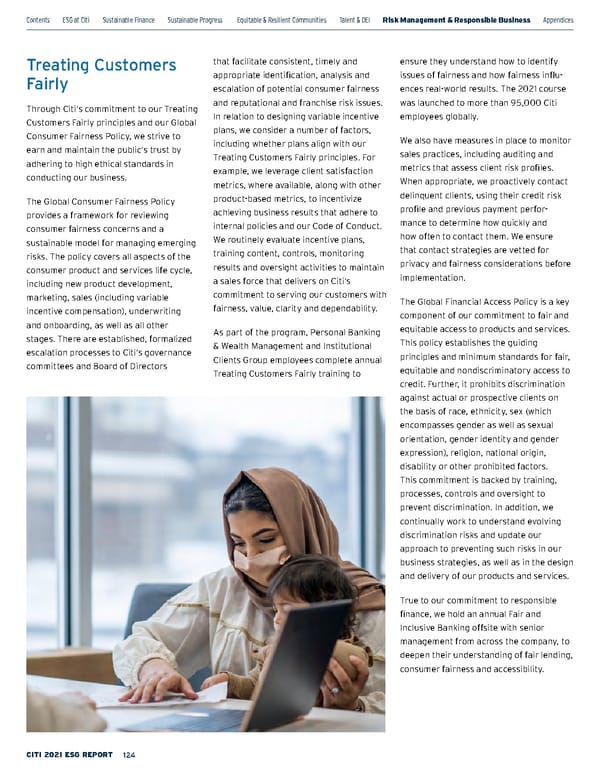Treating Customers Fairly Through Citi’s commitment to our Treating Customers Fairly principles and our Global Consumer Fairness Policy, we strive to earn and maintain the public’s trust by adhering to high ethical standards in conducting our business. The Global Consumer Fairness Policy provides a framework for reviewing consumer fairness concerns and a sustainable model for managing emerging risks. The policy covers all aspects of the consumer product and services life cycle, including new product development, marketing, sales (including variable incentive compensation), underwriting and onboarding, as well as all other stages. There are established, formalized escalation processes to Citi’s governance committees and Board of Directors that facilitate consistent, timely and appropriate identification, analysis and escalation of potential consumer fairness and reputational and franchise risk issues. In relation to designing variable incentive plans, we consider a number of factors, including whether plans align with our Treating Customers Fairly principles. For example, we leverage client satisfaction metrics, where available, along with other product-based metrics, to incentivize achieving business results that adhere to internal policies and our Code of Conduct. We routinely evaluate incentive plans, training content, controls, monitoring results and oversight activities to maintain a sales force that delivers on Citi’s commitment to serving our customers with fairness, value, clarity and dependability. As part of the program, Personal Banking & Wealth Management and Institutional Clients Group employees complete annual Treating Customers Fairly training to ensure they understand how to identify issues of fairness and how fairness influ - ences real-world results. The 2021 course was launched to more than 95,000 Citi employees globally. We also have measures in place to monitor sales practices, including auditing and metrics that assess client risk profiles. When appropriate, we proactively contact delinquent clients, using their credit risk profile and previous payment perfor - mance to determine how quickly and how often to contact them. We ensure that contact strategies are vetted for privacy and fairness considerations before implementation. The Global Financial Access Policy is a key component of our commitment to fair and equitable access to products and services. This policy establishes the guiding principles and minimum standards for fair, equitable and nondiscriminatory access to credit. Further, it prohibits discrimination against actual or prospective clients on the basis of race, ethnicity, sex (which encompasses gender as well as sexual orientation, gender identity and gender expression), religion, national origin, disability or other prohibited factors. This commitment is backed by training, processes, controls and oversight to prevent discrimination. In addition, we continually work to understand evolving discrimination risks and update our approach to preventing such risks in our business s trategies, a s w ell a s i n t he d esign and delivery of our products and services. True to our commitment to responsible finance, we hold an annual Fair and Inclusive Banking offsite with senior management from across the company, to deepen their understanding of fair lending, consumer fairness and accessibility. Contents ESGatCiti SustainableFinance SustainableProgress Equitable&ResilientCommunities Talent&DEI RiskManagement&ResponsibleBusiness Appendices CITI 2021 ESG REPORT 124
 Citi ESG Report Page 123 Page 125
Citi ESG Report Page 123 Page 125